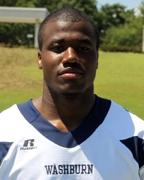Remembering Jermon
August 17, 2011
When a young man dies, be it from an accident or other tragedy, the natural inclination is to mourn and to reflect. With one young man this summer, such is the case.
June 11, 2011, started out as another summer day. In Kansas City, Mo., four football players were driving along that afternoon when they swerved to avoid an oncoming car that had strayed into their lane. The resulting accident resulted in the car flipping into a nearby yard. Among the passengers that afternoon, Jermon Watson would be the young man to not walk away.
Like the head of any kind of family, be it biological or the adoptive family that forms in an atmosphere like being part of a college football team, Washburn head football coach Craig Schurig rushed quickly to the hospital to be present. Schurig spoke about the impact that Watson had as a member of the team, even in his relatively short amount of time at Washburn.
“He was just a neat kid,” said Schurig. “He was always positive and just seemed like he was never going to have a bad day. He was a very bright young man, we never had to worry about his classes. We would ask him about classes and he would just say ‘Its all good coach,’ because he was just a young man that took care of business and we knew we didn’t have to worry about him.”
Beyond that, his fellow teammates seemed to gravitate to the newcomer, an observation that stuck with Schurig.
“You know he came through the dorms the first year and got to know a lot of the freshman real well because of that,” said Schurig. “At the same time, the upperclassmen appreciated him. Jermon was always a team first guy. We recruited him as an outside linebacker/safety position but he quickly outgrew that position. He was fine to do anything to. We would say ‘Hey we want to try you out at defensive end during the fall,’ when he was red-shirted and he said ‘Yeah that’d be good,’ and he just stepped in.”
But it takes more than a sport to define an athlete. While student-athletes are at their school to compete, the impact that Watson had on people off the field was just as important.
“He was big into respect,” said Sierra Moeller, forward on the Lady Blues basketball team. “It didn’t matter who you were, he would be friends with you.”
His very nature impacted the first impression that people like Moeller had on first meeting him. Being so physically impressive despite his youth was something that struck most that came into contact with him.
“I was like ‘who is this kid?'” said Moeller. “He was this 18-year-old kid but he looked like he was 25. But I really first met him when we were at a party in Lawrence and it was cold out and he gave me his jacket and it was just a sweet thing to do. That was when we became friends.”
This kind of impression of being a great guy is something that resonated with his roommates, as well. Toré Hurst, sophomore tight end, summed up his experience with Watson in the time that they first met.
“Ya know when I first saw him, I was like, ‘dang this guy is big,’ and I’m guessing this real big dude is going to be mean,” said Hurst. “As soon as I met him, we’re cracking jokes and joking about people right there in the airport. I mean we just clicked right away.”
As they got to know each other and eventually become roommates, both Hurst and Watson spent time together pursuing a passion of Watson’s.
“Oh man, he was into cars and he had bought an old Caprice out here and we just liked workin’ on that together a lot,” said Hurst. “It broke down three or four times though.”
Even now, Watson’s impact is felt beyond the confines of Washburn’s campus. Watson was a registered organ donor and despite losing his life, has given life to others.
“Yeah he was a registered donor which is just something really neat,” said Schurig. “Something like six people received donations so he saved some people’s lives in the end.”



